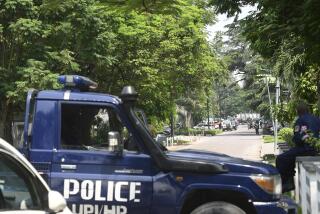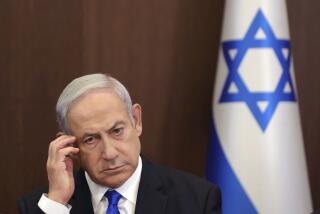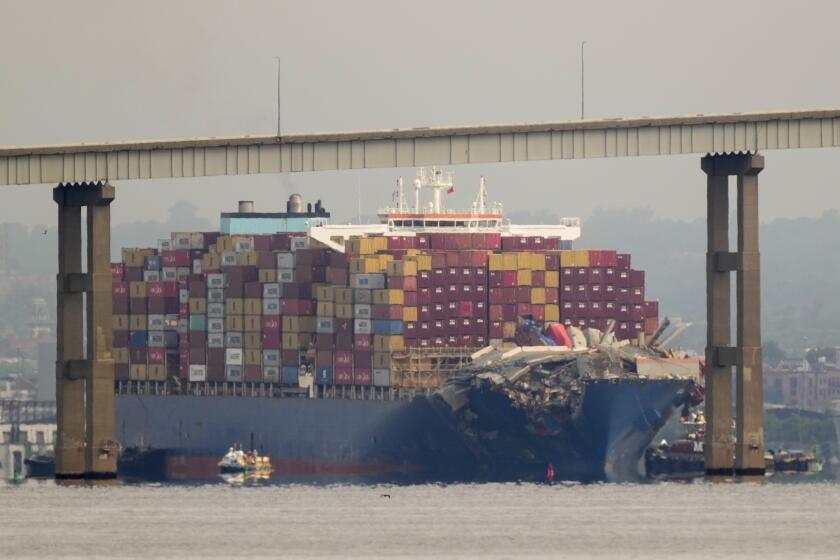Ukraine President to Press U.S. on Disarmament Aid
Having calmed Western concerns about its nuclear arsenal by agreeing to join the Nuclear Non-Proliferation Treaty, Ukraine took its own atomic anxieties to the United States on Saturday as President Leonid D. Kuchma left for a state visit.
Speeding up U.S. aid to pay for the dismantling of nuclear warheads and to support Kuchma’s market reforms will top the agenda of the two-day summit with President Clinton starting Tuesday.
“Ukraine has taken on the enormous burdens of nuclear disarmament,” Ukrainian Foreign Minister Hennady Udovenko said after Parliament accepted the treaty Wednesday. “And we need financial help.”
Although the United States has been promising that help since the George Bush Administration, Ukrainian Defense Minister Valery Shmarov, in Washington last week to prepare for Kuchma’s visit, said the U.S. disarmament funds are being blocked by “bureaucratic barriers and inertia.”
Of the $350 million promised by Washington last year, Ukraine has received no more than $5 million in equipment, Shmarov complained.
As the first big U.S. aid package promised to Ukraine, the assistance program has assumed a symbolic importance that goes beyond physically disposing of the third-largest nuclear arsenal in the post-Cold War world.
“It is indicative of all Western aid,” said Kuchma adviser Bohdan Havrylyshyn, reflecting a widely held view here.
Parliamentary adviser Ian Brzezinski said it is “ironic that the Clinton Administration’s highest-priority assistance program--for denuclearizing Ukraine--has become a principal source of disillusionment with America’s commitment to Ukraine’s future.”
U.S. officials concede that spending has lagged. But their efforts to persuade Ukrainian leaders that aid is in the pipeline have not worked.
“They come here with picture books showing they’ve ordered electric drills which you can buy in any hardware store,” Havrylyshyn said of the thick, illustrated briefing books U.S. officials tote to Kiev. “It’s discouraging, especially when Ukraine is ahead of schedule on delivering warheads.”
Under an agreement signed with the United States and Russia last January, Ukraine has delivered 400 of its 1,800 warheads to Russia in exchange for nuclear fuel, Shmarov said.
As the 176 missiles housing those warheads become militarily useless, so do the 2,500 military officers who service them. Ukraine is trying to spend $50 million of the promised U.S. funds to build civilian housing for the officers.
A cap of $20 million on such housing projects in fiscal 1995, sponsored by Republicans in the U.S. House of Representatives, stands in the way. Nevertheless, most analysts believe that the Republican sweep of the U.S. legislative landscape bodes well for Ukraine, even if it results in an overall decline of American foreign aid.
“There are more Republican senators committed to Ukraine than Democrats,” said Anders Aslund, a Swedish economist who advises Kuchma. “So it’s likely to get a larger share of a smaller cake.”
At this point, however, the amount of aid promised is less important to Ukraine than its delivery.
Since taking office last summer, Kuchma has embarked on an ambitious program of market reform that has earned him the International Monetary Fund’s seal of approval. Now he needs Western financial aid to maintain momentum in the face of opposition in Parliament.
In particular, Ukraine needs $1.5 billion to pay for energy imports from Russia and Turkmenistan, plus a stabilization fund for replacing the inflation-ravaged karbovanets, now worth 150,000 to the dollar, with a new currency.
Although Communists and Socialists make up the largest faction of the Parliament elected last spring, their power is declining. They have been unable to block Kuchma’s reform decrees, including one privatizing farmland.
An indication of leftist strength in the Parliament came last month as a bill lifting a 1991 ban on the Soviet-era Communist Party first passed by three votes. But after an investigation turned up irregularities in the voting, a second vote was taken. The same bill failed by nine.
But that small margin could quickly swing the other way, Kuchma’s advisers warn, when the most painful shocks of market reforms set in.
An infusion of U.S. aid “would strengthen Kuchma’s hand internally,” said adviser Havrylyshyn, a Geneva-based economist.
Aside from government aid, Kuchma will also seek private investment--first in New York, where he flew Saturday, and then in Washington.
More to Read
Start your day right
Sign up for Essential California for news, features and recommendations from the L.A. Times and beyond in your inbox six days a week.
You may occasionally receive promotional content from the Los Angeles Times.






